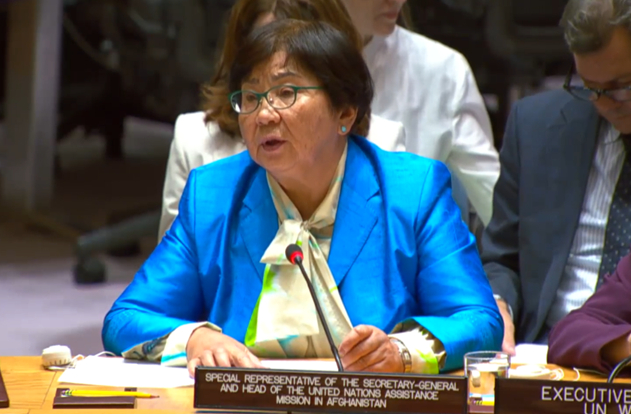At a United Nations Security Council meeting, the head of the UN Assistance Mission in Afghanistan (UNAMA) issued a grave warning about Afghanistan’s worsening humanitarian crisis and the Taliban’s restrictive policies, particularly those affecting women.
Addressing the council, UNAMA chief Roza Otunbayeva emphasized that the Taliban’s continued crackdown on women’s rights, including the new “Vice and Virtue” law, is exacerbating the country’s isolation and deepening its economic and social challenges.
“The de facto authorities are missing an opportunity to harness the full potential of Afghanistan’s population,” Otunbayeva said, noting that the Taliban’s policies, especially the ongoing restrictions on women, are preventing the country from recovering from decades of conflict. “The humanitarian crisis is quickly becoming a development crisis, and this is largely due to the restrictions placed on half the population.”
A Humanitarian Crisis Deepens
Otunbayeva detailed the growing funding shortfall in Afghanistan’s 2024 Humanitarian Response Plan, which is only 30 percent funded, with approximately $900 million received out of the $3 billion required. This shortfall, she explained, has had devastating effects on essential services across the country.
“The humanitarian situation is dire. Real support on the ground has noticeably decreased,” she said, listing critical areas where aid has been scaled back. For example, 260 healthcare facilities have been shut down, impacting nearly 3 million people, and an additional 171 facilities are expected to close in the coming months. The reduction in aid has also left 900,000 children without access to treatment for severe malnutrition, a condition that makes them twelve times more likely to die than their healthy peers.
“Food rations have been reduced from 75 to 50 percent in communities already facing emergency levels of hunger,” she continued, stressing that this disproportionately affects women and children, who make up 80 percent of food assistance beneficiaries. Additionally, mine clearance projects have been scaled back, leaving millions of people, particularly children, at risk from unexploded ordnance.
Otunbayeva warned that with winter approaching and the possibility of hundreds of thousands of undocumented Afghan refugees returning from neighboring countries, the humanitarian crisis would only intensify. “The most basic human needs are not being met,” she said, pointing to the severe drought that has affected nearly 5 million women and children in rural areas without access to clean water.
Afghanistan’s Isolation on the World Stage
Otunbayeva also addressed the broader political challenges Afghanistan faces due to its isolation from the international community. Taliban leaders remain under sanctions, and the country’s central bank assets are frozen, which limits the potential for private sector development. Furthermore, Afghanistan lacks formal representation in multilateral institutions, leaving the Taliban with little access to the diplomatic and economic resources needed to address the country’s challenges.
Otunbayeva pointed to a recent meeting in Doha, where UN and international representatives met with the Taliban to address a range of issues, including human rights concerns. “The delegation from Kabul heard loud and clear the concerns of the international community, but there is little indication that they are willing to shift their stance on the rights of women and girls,” she said.
She underscored that while the international community continues to call for greater accountability, Afghanistan’s diplomatic isolation is stalling progress. “We are trying to address the political legacy of Afghanistan’s long conflict,” she said, but added that the current lack of engagement from the Taliban on key issues, such as women’s rights, is deepening the divide.
Call for International Support
As the humanitarian and political crises deepen, Otunbayeva called on the international community to provide more support to the Afghan people. “We will continue to strenuously advocate for the rights of all Afghans,” she said, “but the de facto authorities must recognize that the exclusion of half their population is a barrier to peace, prosperity, and development.”
Her remarks were a stark reminder of the urgent need for increased international aid and diplomatic efforts to prevent Afghanistan from sliding further into crisis, with the Taliban’s restrictive policies playing a central role in the country’s struggles.
The Impact of the Taliban’s “Vice and Virtue” Law
A central focus of Otunbayeva’s remarks was the Taliban’s recently introduced “Vice and Virtue” law, which enforces strict moral codes and further limits the participation of women in public life. She expressed deep concern over the implications of this law, which, she argued, not only violates human rights but also undermines Afghanistan’s chances of recovery.
“The de facto authorities would not need so much international charity if they unlocked the resourcefulness of their entire population,” Otunbayeva said, highlighting the Taliban’s refusal to allow women to work, attend school, or participate in economic life. “We have seen firsthand how these restrictions are impacting the most vulnerable,” she added, recounting a personal story from her recent visit to southern Afghanistan. “A woman I met told me that after learning to read, she realized she had been giving her children expired medication. This simple skill has the potential to save lives, yet women are being deprived of it.”
She stressed that the Taliban’s actions are not only a violation of human rights but also a barrier to Afghanistan’s long-term stability. “A country cannot thrive when half its population is excluded,” she said, urging the Taliban to reverse these policies.





